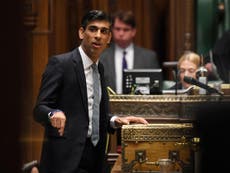New grant available for self-employed but 2.9 million people still excluded
New round of Self-Employed Income Support Scheme open for applications at end of November
Your support helps us to tell the story
From reproductive rights to climate change to Big Tech, The Independent is on the ground when the story is developing. Whether it's investigating the financials of Elon Musk's pro-Trump PAC or producing our latest documentary, 'The A Word', which shines a light on the American women fighting for reproductive rights, we know how important it is to parse out the facts from the messaging.
At such a critical moment in US history, we need reporters on the ground. Your donation allows us to keep sending journalists to speak to both sides of the story.
The Independent is trusted by Americans across the entire political spectrum. And unlike many other quality news outlets, we choose not to lock Americans out of our reporting and analysis with paywalls. We believe quality journalism should be available to everyone, paid for by those who can afford it.
Your support makes all the difference.Self-employed people can apply for a new round of grants to cover lost income but almost 3 million people excluded from support still cannot claim.
Under the Self-Employed Income Support Scheme (SEISS), eligible workers can claim a grant to cover some of of their lost earnings. The rate had been set at 40 per cent of average earnings from the 2018/19 financial year.
A new grant will open for applications from the end of November and now will cover 80 per cent of trading profits for that month, during which England will be in lockdown.
That's the same percentage of their income that PAYE employees are paid under the furlough scheme which has been extended through November.
Support for the self-employed will come down to 40 per cent in December and January, meaning the total maximum SEISS grant is £5,160 for three months. Another grant will be available for February to April, though the level of it is not yet known.
Eligibility criteria will be the same as for previous grants, meaning that up to 2.9 million people remain excluded from government support.
Freelancers, the newly self-employed, contractors who were on PAYE and company directors are among those who have not been able to access help since the pandemic began, despite the fact that many have seen their incomes dry up.
“While the increase in SEISS is welcome, it is deeply troubling that the government has still not fixed the devastating gaps in SEISS, despite urgent recommendations from the Treasury Select Committee,” said Derek Cribb, chief executive of IPSE (the Association of Independent Professionals and the Self-Employed).
“After so many calls to resolve the problems, it now looks as if the government is wilfully ignoring a third of the self-employed.”
Addressing the House of Commons Boris Johnson said he was “truly sorry” for the anguish that new lockdown measures would cause.
“We protected almost 10 million jobs with furlough and we're now extending the scheme throughout November,” Mr Johnson said.
"We've already paid out £13.7bn to help the self-employed and I can announce today that for November we will double our support from 40 to 80 per cent of trading profits."
Chancellor Rishi Sunak had given some cause for hope on Monday morning for workers excluded from the SEISS, saying: "For the self-employed, coming on top of our comprehensive and generous set of support that we have already put in place ... we have announced extensions to our self-employed grants.
"And what we have done, typically, during this crisis, is adjust the value of the grants, as we have adjusted the value of the support to those who are employed."
Speaking on BBC Radio 4's Today programme, he said: "Bearing in mind they are slightly different programmes, and self-employed grants are for three months at a time versus furlough at a month at a time.
"But, broadly, we have adjusted those things and you can expect us to do the same again here, and the Prime Minister will have details of that."
Asked about parity between self-employed and employed support, he added: “They are slightly different because the self-employed grants cover a much longer time period… the 40 per cent will go up to reflect at least one of those months of support will be at a higher level.”
“If you’re asking me are there people who are going to have lost their jobs over the past few months as a result of what’s going on, the answer is obviously yes.
"We know that close to three-quarters of a million people have already tragically lost their jobs. And sadly many more will and that is going to happen as a result of the restrictions that we’re putting in place.”


Join our commenting forum
Join thought-provoking conversations, follow other Independent readers and see their replies
Comments